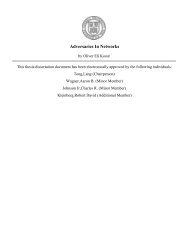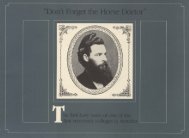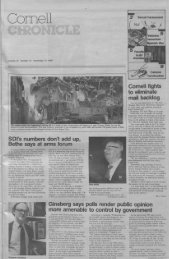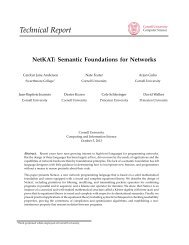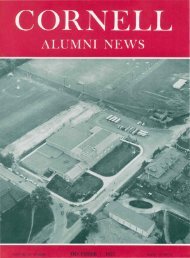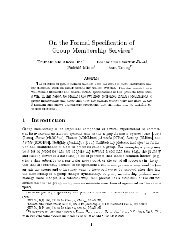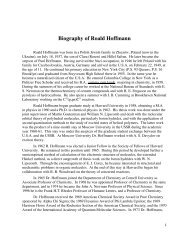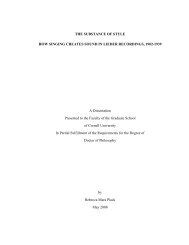Cornell Alumni News - eCommons@Cornell - Cornell University
Cornell Alumni News - eCommons@Cornell - Cornell University
Cornell Alumni News - eCommons@Cornell - Cornell University
You also want an ePaper? Increase the reach of your titles
YUMPU automatically turns print PDFs into web optimized ePapers that Google loves.
<strong>University</strong> (which will begin offering<br />
courses in September) will eventually find<br />
their way into the regular university curriculum.<br />
Perhaps The Free <strong>University</strong> is a<br />
source of embarrassment to the administration;<br />
certainly, the name, by implication,<br />
casts aspersions upon Day Hall's<br />
university. Yet, when the diverse list of<br />
courses contemplated by the group is<br />
viewed, one can understand why the administration<br />
has not yet sanctioned reggular<br />
academic courses-for-credit in these<br />
areas. The subjects tend to be extremely<br />
topical, even faddish, and often seem not<br />
to justify more than one or two lectures.<br />
Courses for which professors have already<br />
been found include: The <strong>University</strong> in<br />
Transition; Southern Politics and the Negro<br />
Problem; The Death of God; Existentialism;<br />
and Ideologies of Economic Development<br />
in Latin America (which will<br />
be taught by a graduate student).<br />
Another group of courses will be taught<br />
as soon as instructors are found. Included<br />
are: Pop Art and After; The Literature<br />
of the American Negro; The Current<br />
American Stage; Comparative Religion;<br />
and Sexual Expression. But the list does<br />
not end here. Students at the organizational<br />
meeting surprised the organizers<br />
with their widely varied suggestions. A<br />
few of the courses that were requested<br />
from the floor are: Mind Amplification;<br />
Pacifism or Conscientious Objection;<br />
Black Humor; McCarthyism and its<br />
Remnants; Suicide; Problems of <strong>Cornell</strong><br />
Phenomonology; and a laboratory course<br />
in Political Protest.<br />
In an article entitled "It's the Same Old<br />
Thing," published in the May 6 <strong>Cornell</strong><br />
Sun, student Mark A. Sommer '67<br />
pointed out that The Free <strong>University</strong><br />
idea has been employed already at<br />
Berkeley, in New York, and at Brown,<br />
where a student can earn his B.A. through<br />
The Free <strong>University</strong>. Sommer added<br />
that: "the topics suggested for courses<br />
were often a little humorous in their<br />
vagueness and a little pathetic in their<br />
imitative character: drugs, poverty, anarchy,<br />
sexual expression. One wonders<br />
what can be gotten out of a round-table<br />
discussion of 'sexual expression.' "<br />
Sommer's contention that <strong>Cornell</strong> students<br />
should discover new areas that<br />
other college communities have not investigated<br />
seems irrelevant: merely because<br />
the free university idea has been<br />
tried at Berkeley first is no reason to exclude<br />
it from Ithaca. But his consideration<br />
of the topics offered seems worthy<br />
of thought. Many of the courses established<br />
within <strong>Cornell</strong>'s Free <strong>University</strong><br />
have the aura of sensationalism. The test<br />
of sincere student interest might well be<br />
to compare the number of people attending<br />
"<strong>University</strong> in Transition" lectures<br />
with the number present at a typical<br />
"Sexual Expression" course. Both<br />
topics should have high interest content<br />
for truly concerned students, although<br />
the "<strong>University</strong> in Transition" seems a<br />
less exhaustible subject.<br />
President Perkins has come under a<br />
mild barrage of fire within these recent<br />
developments. An article in the May 2<br />
Sun called Perkins' recently published<br />
The <strong>University</strong> in Transition "an intellectual<br />
justification for the modern multiversity<br />
and the role it is playing in<br />
society. Mr. Perkins accepts the increasingly<br />
specialized nature of research, and<br />
indeed, the increasing specialization of<br />
learning at the undergraduate level. The<br />
problems with which students and faculty<br />
are really concerned must be taught, and<br />
if they cannot be found in the structure<br />
of <strong>Cornell</strong>, as too often they cannot,<br />
then we must go beyond that structure."<br />
A spreading theory, only recently being<br />
voiced on the campus, is that the<br />
students are beginning to gain more control<br />
of their academic futures than is<br />
good for them. The same article from the<br />
May 2 Sun suggested that: "The student<br />
. . . should decide about certain aspects<br />
of his own life, including what he wants<br />
to study." What at first seemed a healthy<br />
student interest in academic administration<br />
and the quality of courses offered<br />
may well develop into irrational demands<br />
that, if granted, the students themselves<br />
will live to regret. If this argument is<br />
taken to its extreme, we see that The<br />
Free <strong>University</strong> could gain academic<br />
recognition, and that the student who<br />
"should decide . . . what he wants to<br />
study," could graduate from <strong>Cornell</strong><br />
with a BA in Sexual Expression.<br />
Professor L. Peatce Williams '48,<br />
PhD '52, sensing that the students are<br />
touting academic reform largely for reasons<br />
of private laziness, recently told a<br />
group of students at a history lecture:<br />
"You want knowledge poured into you<br />
like an open bucket. You want to be instructed,<br />
not taught. . . . You can instruct<br />
a bird-dog; we are supposed to educate<br />
you." Williams said that he had been active<br />
in Students For Education, a group<br />
that last spring attempted to abolish the<br />
grading system. "From now on I will be<br />
more skeptical of these things," he said,<br />
adding that the grade is the most effective<br />
means of ensuring student motivation.<br />
Of course, there is little chance that<br />
The Free <strong>University</strong> will ever gain such<br />
a strong grip on the university community.<br />
Skeptics believe that simply because<br />
no credit is given with the courses offered,<br />
The Free <strong>University</strong> will crumble<br />
within weeks of its inception next September.<br />
Initial interest may be high, but<br />
as soon as the student has to decide between<br />
attending a Free <strong>University</strong> lecture<br />
and earning an A on the next day's<br />
prelim, he will follow his competitivelyconditioned<br />
desire to get a high grade.<br />
Since a principal contention of student<br />
academic reform groups is that the love<br />
of learning should supercede the desire<br />
for a good grade, such a demise would<br />
be an ironical end to The Free <strong>University</strong>.<br />
CLASS NOTES<br />
Addresses in the following columns are in<br />
New York State unless otherwise noted,<br />
Personal items, newspaper clippings, or<br />
other notes are welcomed for publication.<br />
'99 ME - E. Austin Barnes of 322 Farmer<br />
St., Syracuse, was honored on his 90th birthday,<br />
April 7, by 107 fellow members of the<br />
Century Club of Syracuse. <strong>Cornell</strong>ians attending<br />
the dinner party in addition to<br />
"Skipper" were Charles Estabrook ΌO,<br />
Henry W. Brown Ίl, William J. Thorne Ίl,<br />
William H. G. Murray '16, Frederick Scott<br />
'18, Charles A. Wood '22, Henry S. Fraser<br />
'26, Foster T. Rhodes '28, David A. Fraser,<br />
LL.B. '37, Roger T. Clark '41, Follett Hodgkins,<br />
Jr. '49, Stewart F. Hancock, Jr., LL.B.<br />
'50, Edward B. Collum '52, and Thad P.<br />
Collum '53.<br />
'08 - Attending the 1908 Reunion committee<br />
meeting on April 19 at the <strong>Cornell</strong> Club<br />
of New York were: William B. Mennon,<br />
John Holt, Sid Gridley, M. J. Hartung, Howard<br />
Simonds, George N. Brown, J. W. Taussig,<br />
Seth Shoemaker, and Edwin S. Boegehold.<br />
Recent deaths among the class include<br />
Ernest Billwer, 5/12/64; Jacques Birkhahn,<br />
5/31/65; Samuel Boothroyd, 4/4/65; Seth<br />
Bullis, 2/25/66; Gardner Bullis, 2/25/66; Lyall<br />
Decker, 9/25/65; Harold Desbecker,<br />
6/12/65; Victor Herriman, 1/9/66; Stanley<br />
Japhet, 10/16/65; Stanley Mellen, 2/15/66;<br />
Lt. Col. Robert Owens, 10/15/65; John Ridenour,<br />
6/7/65; Lewis Toan, 8/30/65; Richard<br />
Watson, 10/16/65; Katherine Larkin Abbott<br />
(Mrs. William), 11/30/64; Mary Caldwell<br />
Dransfield (Mrs. Thomas), 5/10/65; and<br />
Pearl Gertrude Sheldon, 2/24/66.<br />
There were 825 graduated in our class,<br />
and according to the records of the <strong>Alumni</strong><br />
Office, there are now 256 living. The records<br />
list 77 women living.<br />
1908 was well supplied with good athletes,<br />
June 1966 29




